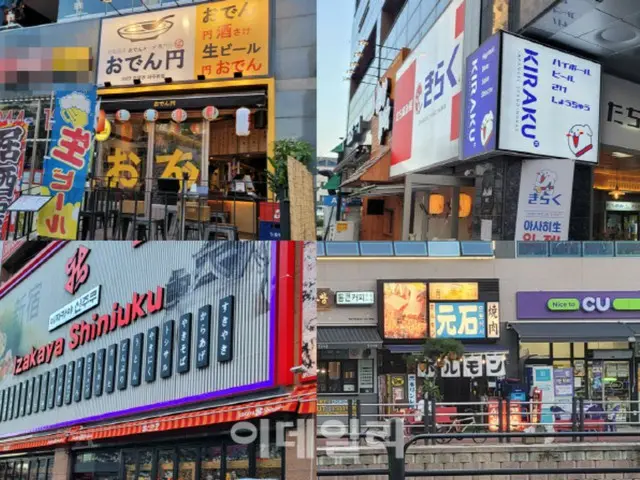That's because there were a lot of signboards gathered together. At some restaurants, I couldn't look up Hangul, so I couldn't even guess what kind of food they were selling. Mr. Chung said, ``Recently, I
It seems like a 'trend' for Kita restaurants to have a Japanese feel," and added, "I think it's special because it gives it an exotic feel, but I'm not sure what kind of food they sell. Korean is also available.
I want you to do that." The restaurant sign that Chung saw is technically illegal. According to the Outdoor Object Advertising Law, characters on outdoor advertising materials such as billboards must be displayed in Hangul in principle.
It also stipulates that even if foreign characters are used, they must be written in Hangul unless there are special reasons. However, according to the Outdoor Objects Advertising Law, a billboard with an area of 5 square meters or less that is installed on the 4th floor or lower
Boards do not need to be notified. Since there are no permits or declaration procedures, there is virtually no enforcement. Many signboards in Japanese can be seen in the downtown areas of the Tokyo metropolitan area. Gyeonggi-do (Gyeonggi-do)
In a certain downtown area, I see many signs in Japanese among newly opened restaurants. At the time of the 2019 "No Japan" hot wind, the izakaya signboard was removed and replaced with a Korean-style menu.
It looks different than it did before. A citizen I met at a Japanese-style izakaya said, ``Recently, the yen has become cheaper, and I have more friends who are traveling to Japan.'' ``I visited the izakaya because I wanted to feel Japan after my trip.'' Recently, the Japanese style has become popular.
"It seems like it is." Recently, a Japanese-style tavern in downtown Seoul has been the subject of controversy after a sign resembling the motto from the Japanese Empire era, ``Inland and South Korea are one,'' has appeared. Gwangjin, Seoul
) The large signboard of this izakaya located in the ward shows two people running while dancing on each other's shoulders. The parody signboard is similar to the famous tourist spot "Glico" in Dotonbori, Osaka, but some of it is
"I feel uncomfortable," he said. The slogan ``Unity in Korea'' was created by Japan to rationalize its control of Korea, and it means that Japan's mainland and Korea are one. The slot that Japan is one with Korea
Together with Gan, he held up a poster showing two people from Korea and Japan running together. The Korean Unification Movement also included efforts to erase Korean culture, such as changing the So family name, emphasizing visiting shrines, and living in Japanese.
On the other hand, netizens were debating the billboards, which resembled the one between Korea and North Korea, with some calling it ``disgusting'' and others calling it ``deterrence discussion.'' One netizen said, ``I think they were trying to give off a Japanese atmosphere.
, it seems like they've crossed the line," and another netizen said, "There's Korean Street in Japan too, and aren't there many shops based on the concept of food stalls?"
2023/10/02 21:34 KST
Copyrights(C) Edaily wowkorea.jp 78

